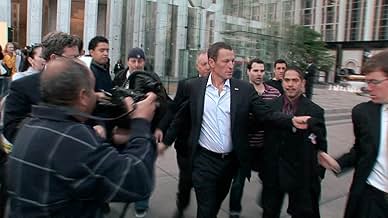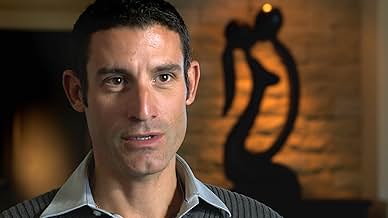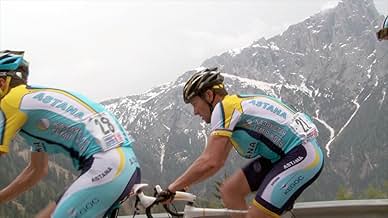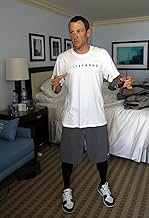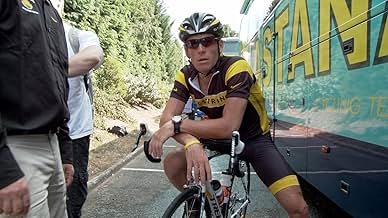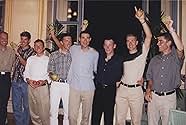PUNTUACIÓN EN IMDb
7,2/10
8,2 mil
TU PUNTUACIÓN
Añade un argumento en tu idiomaA documentary chronicling sports legend Lance Armstrong's improbable rise and ultimate fall from grace.A documentary chronicling sports legend Lance Armstrong's improbable rise and ultimate fall from grace.A documentary chronicling sports legend Lance Armstrong's improbable rise and ultimate fall from grace.
- Nominado a 1 premio BAFTA
- 2 premios y 8 nominaciones en total
Michael Bloomberg
- Self - NYC Mayor
- (metraje de archivo)
Bill Clinton Jr.
- Self - Former US President
- (metraje de archivo)
Anderson Cooper
- Self - Interviewer
- (metraje de archivo)
Sheryl Crow
- Self - Lance's Girlfriend
- (metraje de archivo)
Tyler Hamilton
- Self - Teammate
- (metraje de archivo)
Reseñas destacadas
THE ARMSTRONG LIE is a fascinating documentary. Shot over a period of four years, it purports to investigate the oft-repeated claim that cyclist Lance Armstrong was a cheat, and that every single one of his Tour de France wins were achieved by taking drugs. Alex Gibney's narrative begins as a defense of Armstrong's behavior, but as different elements of the truth emerge, so the filmmaker has to keep readjusting his position. Gibney is obviously a fan of Armstrong (as many people still are), but as the seamy details of what the cyclist did in order to win his races gradually emerge, so the filmmaker gradually understands how wrong-headed he has been give his unquestioning support. Armstrong emerges as a thoroughly unsavory character, pathologically unwilling to acknowledge the truth about himself, and always looking to manipulate the media so that he emerges in a positive light. Even his so-called 'confessional' interview with Oprah looks like a deliberate attempt to rescue his reputation. As the narrative unfolds, so Gibney gradually comes to understand the truth about his subject, and realizes to his cost that much of the film has unwittingly helped to obfuscate that truth, portraying Armstrong instead as a man more sinned against than sinning. It is only right at the end that Gibney admits the truth of Armstrong's motives, and how Armstrong himself has deliberately duped the filmmaker. As a result THE ARMSTRONG LIE is a film that is more about media manipulation than anything else, revealing just how persuasive - and dangerous - a person Armstrong actually is. There's no guarantee that he might not manage to clear his reputation in the future, despite what he has done.
I always admire the commitment of a documentarian. It feels destined for Alex Gibney to have been following Lance Armstrong just before the turn of his downfall as all his documentaries need a tinge of controversy before they're just right. A comeback film wouldn't have been as interesting as this. Perhaps it's morbid curiosity of why I'm looking into Lance Armstrong more now that the truth has broken out than when he was heroic cyclist who wasn't held back by a little cancer. What brings a man to do something like this? What was the point? The Armstrong Lie has intimate access to the disgraced icon and it's undeniable that he's compelling to watch, if sometimes repulsive. Above all, it reveals the nature of our celebrity worship culture and the power it feeds and the lives it destroys.
The documentary covers all aspects of the sport of cycling. It's quite infectious with its cinematic style and I regret watching this the day that the Tour de France was close to me but I missed it. The film gives scattered information about the basics but there's great insight into how the cheating works. The cutting makes the human drama thrilling as people try to beat Armstrong at his game. The film doesn't necessarily take a side, but he still makes you sick to your stomach when he lies through his teeth to the camera. I couldn't help but keep thinking that Ben Foster will be perfect for Stephen Frears' upcoming film. We still haven't got all the facts, especially about Armstrong's peers, and there's quite a bit about media manipulation here too which the film is a part of, but the story of a contemporary legend falling touches an aching nerve.
8/10
The documentary covers all aspects of the sport of cycling. It's quite infectious with its cinematic style and I regret watching this the day that the Tour de France was close to me but I missed it. The film gives scattered information about the basics but there's great insight into how the cheating works. The cutting makes the human drama thrilling as people try to beat Armstrong at his game. The film doesn't necessarily take a side, but he still makes you sick to your stomach when he lies through his teeth to the camera. I couldn't help but keep thinking that Ben Foster will be perfect for Stephen Frears' upcoming film. We still haven't got all the facts, especially about Armstrong's peers, and there's quite a bit about media manipulation here too which the film is a part of, but the story of a contemporary legend falling touches an aching nerve.
8/10
When everyone cheats, it becomes a different contest. The powerful friends, money (125 million plus), risk and pain tolerance, influential scientists, compelling story, performance enhancing drugs, viciousness, ambition to win at all costs, willingness to bully others, . . . Armstrong has all this and more. The documentary is a powerful and gripping indictment not just of Armstrong and cycling, but of sports and humanity in general. Armstrong's doping is bad, but his abuse of power is worse. The film shows how willing people are to be fooled, or to trample on others. Despite its two-hour length, the film held my interest throughout. There are so many parallels in a short story by Nathaniel Hawthorne, wherein he writes, "There is something truer and more real, than what we can see with the eyes, and touch with the finger." So too with Armstrong, cycling, sports, and all of us. This brilliant documentary helps bring such truths to the surface.
This movie - and the situation it chronicles - forces us to consider
to what extent we can expect an even playing field - literally - when we watch sports. The athletes say, "Every one else was doing it."
When fans watch NASCAR races, I hope they understand that it's a team sport. The people who built the car, the people who maintain it, the guys who change the tires, the spotters and others contribute as much or more to the win as does the driver. However, when we see an individual athlete - biker, runner, skier, etc. - compete, do we see that the "best man" wins or the performer with the best doctor, the best chemist and research department and the cleverest lawyer to get around the system, as one of the interviewees in this movie suggests.
Should we accept that performance enhancements are now a part of sports, athletes and their supporters will continue to find ways to counter efforts to limit them and accept that? The destructive qualities of steroids - including their potential for violent behavior and the process Armstrong admitted using raise doubt. The drug Amstrong took and the use of blood transfusions to short-cut the body's process for communicating and responding to muscle fatigue surely must be physically destructive. However, I have long had questions about the long-term effects of professional football tackles, questions now being answered, at least in terms of head injuries. Players and fans continue to accept this.
This movie may be more interesting to people who are not cycling fans but is a good exploration of a range of observers and participants.
to what extent we can expect an even playing field - literally - when we watch sports. The athletes say, "Every one else was doing it."
When fans watch NASCAR races, I hope they understand that it's a team sport. The people who built the car, the people who maintain it, the guys who change the tires, the spotters and others contribute as much or more to the win as does the driver. However, when we see an individual athlete - biker, runner, skier, etc. - compete, do we see that the "best man" wins or the performer with the best doctor, the best chemist and research department and the cleverest lawyer to get around the system, as one of the interviewees in this movie suggests.
Should we accept that performance enhancements are now a part of sports, athletes and their supporters will continue to find ways to counter efforts to limit them and accept that? The destructive qualities of steroids - including their potential for violent behavior and the process Armstrong admitted using raise doubt. The drug Amstrong took and the use of blood transfusions to short-cut the body's process for communicating and responding to muscle fatigue surely must be physically destructive. However, I have long had questions about the long-term effects of professional football tackles, questions now being answered, at least in terms of head injuries. Players and fans continue to accept this.
This movie may be more interesting to people who are not cycling fans but is a good exploration of a range of observers and participants.
Many were shocked when Lance Armstrong (finally) admitted to his use of steroids, which assisted in his 7 Tour Du France wins. Stripped of his titles, dumped by his multi-million dollar sponsorships, banned from all World Anti-Doping Agency governed sports, and literally taken out of the record books for all 7 years he won, most expected him to experience a deep shame and regret over his actions. Most of us, upon revealing our deepest secrets, and the lies that we chose to live, might respond in that way, but Lance Armstrong is a different kind of person, and perhaps doesn't function in the same capacity.
Oscar winning documentary film maker Alex Gibney tackles another societal dysfunction, in his attempt to tell the story of why one of sporting world's most famous names, would come out to admit his fraud to the world. It's an absolutely spellbinding story, and doesn't tip-toe around the subject. Rather, it opens up at his most publicly shameful moments, when he told Oprah Winfrey on national television (in yes / no fashion) that he had been cheating the whole time he was winning one of the most grueling competitions in the world. But there is a great deal more to this story, and Gibney delves into some of the bigger problems surrounding the sport, his issues with bullying team mates, the nature of cheating, and most importantly: Why Armstrong acts the way he does.
The American Psychiatric Association defines the narcissistic personality as:
"In which a person is excessively preoccupied with personal adequacy, power, prestige and/or vanity, mentally unable to see the destructive damage they are causing to themselves and often others."
Whenever I think of this personality, a few names come to mind (Donald Trump, and Kanye West are just a few), but I think Lance Armstrong fits this description well. I don't particularly think that he, and others who share these traits, are necessarily terrible people, but it does make them capable of some truly awful actions. It's a remarkable study into this type of personality. Armstrong admits to wrong-doings, but never feels remorse for his actions. It's remarkable how he treats his own teammates throughout his career, and forces us to see him as a very driven man, yet at the same time, one capable of very criminal action.
At this time, in 2016, Armstrong faces a 100 million dollar lawsuit brought forth by the federal government for defrauding the U.S. Postal service (the main sponsor during his tours). It's expected to ruin him financially, but many don't expect a decision requiring a full penalty. Perhaps his actions do have consequences, but he's apt not to let that bother him. That being said, Alex Gibney narrates and describes the situation facing him and sport of cycling rather well. I would recommend this documentary to anyone who was interested in Armstrong as a competitor, but also to really let the depth of his actions sink in with the viewer.
One of Gibney's best, and more personal documentaries.
8/10
Oscar winning documentary film maker Alex Gibney tackles another societal dysfunction, in his attempt to tell the story of why one of sporting world's most famous names, would come out to admit his fraud to the world. It's an absolutely spellbinding story, and doesn't tip-toe around the subject. Rather, it opens up at his most publicly shameful moments, when he told Oprah Winfrey on national television (in yes / no fashion) that he had been cheating the whole time he was winning one of the most grueling competitions in the world. But there is a great deal more to this story, and Gibney delves into some of the bigger problems surrounding the sport, his issues with bullying team mates, the nature of cheating, and most importantly: Why Armstrong acts the way he does.
The American Psychiatric Association defines the narcissistic personality as:
"In which a person is excessively preoccupied with personal adequacy, power, prestige and/or vanity, mentally unable to see the destructive damage they are causing to themselves and often others."
Whenever I think of this personality, a few names come to mind (Donald Trump, and Kanye West are just a few), but I think Lance Armstrong fits this description well. I don't particularly think that he, and others who share these traits, are necessarily terrible people, but it does make them capable of some truly awful actions. It's a remarkable study into this type of personality. Armstrong admits to wrong-doings, but never feels remorse for his actions. It's remarkable how he treats his own teammates throughout his career, and forces us to see him as a very driven man, yet at the same time, one capable of very criminal action.
At this time, in 2016, Armstrong faces a 100 million dollar lawsuit brought forth by the federal government for defrauding the U.S. Postal service (the main sponsor during his tours). It's expected to ruin him financially, but many don't expect a decision requiring a full penalty. Perhaps his actions do have consequences, but he's apt not to let that bother him. That being said, Alex Gibney narrates and describes the situation facing him and sport of cycling rather well. I would recommend this documentary to anyone who was interested in Armstrong as a competitor, but also to really let the depth of his actions sink in with the viewer.
One of Gibney's best, and more personal documentaries.
8/10
¿Sabías que...?
- CuriosidadesFilmmaker Alex Gibney followed Lance Armstrong for four years with the intent of chronicling his return to cycling after retirement as Armstrong tried to win his eighth Tour de France. Unexpectedly, Gibney was also there when Armstrong admitted to doping, which resulted in the film being retitled from "The Road Back" to "The Armstrong Lie."
- Citas
Lance Armstrong: I viewed my battle with cancer as an athletic competition. But in that, you either win or you lose. When you lose, or if you lose, you die. So I took that perspective, which is a little dark, and I put it into everything I've done since then. I like to win. But more than anything, I can't stand the idea of losing, because, to me, that equals death.
- ConexionesFeatured in At the Movies: Venice Film Festival 2013 (2013)
Selecciones populares
Inicia sesión para calificar y añadir a tu lista para recibir recomendaciones personalizadas
- How long is The Armstrong Lie?Con tecnología de Alexa
Detalles
- Fecha de lanzamiento
- País de origen
- Sitio oficial
- Idioma
- Títulos en diferentes países
- The Armstrong Lie
- Empresas productoras
- Ver más compañías en los créditos en IMDbPro
Taquilla
- Recaudación en Estados Unidos y Canadá
- 383.294 US$
- Fin de semana de estreno en EE. UU. y Canadá
- 28.992 US$
- 10 nov 2013
- Recaudación en todo el mundo
- 594.394 US$
- Duración2 horas 4 minutos
- Color
- Mezcla de sonido
Contribuir a esta página
Sugerir un cambio o añadir el contenido que falta







